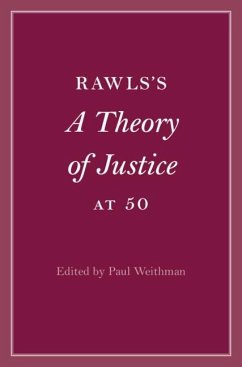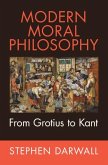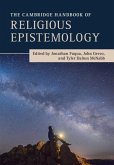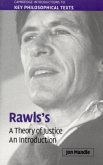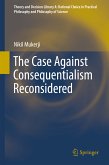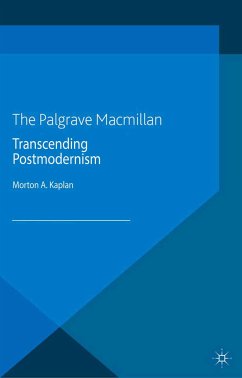Rawls's A Theory of Justice at 50 (eBook, PDF)
Redaktion: Weithman, Paul
92,95 €
92,95 €
inkl. MwSt.
Sofort per Download lieferbar

46 °P sammeln
92,95 €
Als Download kaufen

92,95 €
inkl. MwSt.
Sofort per Download lieferbar

46 °P sammeln
Jetzt verschenken
Alle Infos zum eBook verschenken
92,95 €
inkl. MwSt.
Sofort per Download lieferbar
Alle Infos zum eBook verschenken

46 °P sammeln
Rawls's A Theory of Justice at 50 (eBook, PDF)
Redaktion: Weithman, Paul
- Format: PDF
- Merkliste
- Auf die Merkliste
- Bewerten Bewerten
- Teilen
- Produkt teilen
- Produkterinnerung
- Produkterinnerung

Bitte loggen Sie sich zunächst in Ihr Kundenkonto ein oder registrieren Sie sich bei
bücher.de, um das eBook-Abo tolino select nutzen zu können.
Hier können Sie sich einloggen
Hier können Sie sich einloggen
Sie sind bereits eingeloggt. Klicken Sie auf 2. tolino select Abo, um fortzufahren.

Bitte loggen Sie sich zunächst in Ihr Kundenkonto ein oder registrieren Sie sich bei bücher.de, um das eBook-Abo tolino select nutzen zu können.
- Geräte: PC
- mit Kopierschutz
- eBook Hilfe
- Größe: 2.43MB
- FamilySharing(5)
Andere Kunden interessierten sich auch für
![Modern Moral Philosophy (eBook, PDF) Modern Moral Philosophy (eBook, PDF)]() Stephen DarwallModern Moral Philosophy (eBook, PDF)31,95 €
Stephen DarwallModern Moral Philosophy (eBook, PDF)31,95 €![Cambridge Handbook of Religious Epistemology (eBook, PDF) Cambridge Handbook of Religious Epistemology (eBook, PDF)]() Cambridge Handbook of Religious Epistemology (eBook, PDF)25,95 €
Cambridge Handbook of Religious Epistemology (eBook, PDF)25,95 €![Rawls's 'A Theory of Justice' (eBook, PDF) Rawls's 'A Theory of Justice' (eBook, PDF)]() Jon MandleRawls's 'A Theory of Justice' (eBook, PDF)30,95 €
Jon MandleRawls's 'A Theory of Justice' (eBook, PDF)30,95 €![The Case Against Consequentialism Reconsidered (eBook, PDF) The Case Against Consequentialism Reconsidered (eBook, PDF)]() Nikil MukerjiThe Case Against Consequentialism Reconsidered (eBook, PDF)40,95 €
Nikil MukerjiThe Case Against Consequentialism Reconsidered (eBook, PDF)40,95 €![Transcending Postmodernism (eBook, PDF) Transcending Postmodernism (eBook, PDF)]() M. KaplanTranscending Postmodernism (eBook, PDF)40,95 €
M. KaplanTranscending Postmodernism (eBook, PDF)40,95 €![Mill on Justice (eBook, PDF) Mill on Justice (eBook, PDF)]() Mill on Justice (eBook, PDF)40,95 €
Mill on Justice (eBook, PDF)40,95 €![John Stuart Mill (eBook, PDF) John Stuart Mill (eBook, PDF)]() John Stuart Mill (eBook, PDF)40,95 €
John Stuart Mill (eBook, PDF)40,95 €-
-
-
Produktdetails
- Verlag: Cambridge University Press
- Englisch
- ISBN-13: 9781009214674
- Artikelnr.: 68997229
Dieser Download kann aus rechtlichen Gründen nur mit Rechnungsadresse in A, B, BG, CY, CZ, D, DK, EW, E, FIN, F, GR, HR, H, IRL, I, LT, L, LR, M, NL, PL, P, R, S, SLO, SK ausgeliefert werden.
- Herstellerkennzeichnung Die Herstellerinformationen sind derzeit nicht verfügbar.
Part I. Rawls and History: 1. 'Taillight illumination: how Rawlsian
concepts may improve understanding of Hobbes's political philosophy' S. A.
Lloyd; 2. 'The theory Rawls, the 1844 Marx, and the market' Daniel Brudney;
3. 'Rawls, Lerner, and the tax-and-spend booby trap: what happened to
monetary policy?' Aaron James; 4. 'Rawls's principles of justice as a
transcendence of class warfare' Elizabeth Anderson; 5. 'The significance of
injustice' Peter de Marneffe; Part II. Developments between A Theory of
Justice and Political Liberalism: 6. 'On being a 'self-originating source
of valid claims' Stephen Darwall; 7. ' Moral independence revisited: a note
on the development of Rawls's thought from 1977-1980 and beyond' Samuel
Scheffler; 8. 'The method of insulation: on the development of Rawls's
thought after a theory of justice' Rainer Forst; 9. 'The stability or
fragility of justice' Japa Pallikkathayil; Part III. Rawls, Ideal Theory
and the Persistence of Injustice: 10. 'The circumstances of justice' Erin
I. Kelly; 11. 'Why Rawls's ideal theory leaves the well-ordered society
vulnerable to structural oppression' Henry S. Richardson; 12. 'Race,
reparations, and justice as fairness' Tommie Shelby; 13. ' On the role of
the original position in Rawls's theory: reassessing the 'idealization' and
'fact-sensitivity' critiques' Laura Valentini; Part IV. Pluralism,
Democracy and the Future of Justice as Fairness: 14. 'Public reason at
fifty' Kevin Vallier; 15. 'Reasonable political conceptions and the
well-ordered liberal society' Samuel Freeman; 16. 'Religious pluralism and
social unions' Paul Weithman; 17. 'One Person, at least one vote? Rawls on
political equality...within limits' David Estlund; 18. 'Reflections on
democracy's fragility' Joshua Cohen; 19. 'A society of self-respect' Leif
Wenar; Bibliography; Index.
concepts may improve understanding of Hobbes's political philosophy' S. A.
Lloyd; 2. 'The theory Rawls, the 1844 Marx, and the market' Daniel Brudney;
3. 'Rawls, Lerner, and the tax-and-spend booby trap: what happened to
monetary policy?' Aaron James; 4. 'Rawls's principles of justice as a
transcendence of class warfare' Elizabeth Anderson; 5. 'The significance of
injustice' Peter de Marneffe; Part II. Developments between A Theory of
Justice and Political Liberalism: 6. 'On being a 'self-originating source
of valid claims' Stephen Darwall; 7. ' Moral independence revisited: a note
on the development of Rawls's thought from 1977-1980 and beyond' Samuel
Scheffler; 8. 'The method of insulation: on the development of Rawls's
thought after a theory of justice' Rainer Forst; 9. 'The stability or
fragility of justice' Japa Pallikkathayil; Part III. Rawls, Ideal Theory
and the Persistence of Injustice: 10. 'The circumstances of justice' Erin
I. Kelly; 11. 'Why Rawls's ideal theory leaves the well-ordered society
vulnerable to structural oppression' Henry S. Richardson; 12. 'Race,
reparations, and justice as fairness' Tommie Shelby; 13. ' On the role of
the original position in Rawls's theory: reassessing the 'idealization' and
'fact-sensitivity' critiques' Laura Valentini; Part IV. Pluralism,
Democracy and the Future of Justice as Fairness: 14. 'Public reason at
fifty' Kevin Vallier; 15. 'Reasonable political conceptions and the
well-ordered liberal society' Samuel Freeman; 16. 'Religious pluralism and
social unions' Paul Weithman; 17. 'One Person, at least one vote? Rawls on
political equality...within limits' David Estlund; 18. 'Reflections on
democracy's fragility' Joshua Cohen; 19. 'A society of self-respect' Leif
Wenar; Bibliography; Index.
Part I. Rawls and History: 1. 'Taillight illumination: how Rawlsian
concepts may improve understanding of Hobbes's political philosophy' S. A.
Lloyd; 2. 'The theory Rawls, the 1844 Marx, and the market' Daniel Brudney;
3. 'Rawls, Lerner, and the tax-and-spend booby trap: what happened to
monetary policy?' Aaron James; 4. 'Rawls's principles of justice as a
transcendence of class warfare' Elizabeth Anderson; 5. 'The significance of
injustice' Peter de Marneffe; Part II. Developments between A Theory of
Justice and Political Liberalism: 6. 'On being a 'self-originating source
of valid claims' Stephen Darwall; 7. ' Moral independence revisited: a note
on the development of Rawls's thought from 1977-1980 and beyond' Samuel
Scheffler; 8. 'The method of insulation: on the development of Rawls's
thought after a theory of justice' Rainer Forst; 9. 'The stability or
fragility of justice' Japa Pallikkathayil; Part III. Rawls, Ideal Theory
and the Persistence of Injustice: 10. 'The circumstances of justice' Erin
I. Kelly; 11. 'Why Rawls's ideal theory leaves the well-ordered society
vulnerable to structural oppression' Henry S. Richardson; 12. 'Race,
reparations, and justice as fairness' Tommie Shelby; 13. ' On the role of
the original position in Rawls's theory: reassessing the 'idealization' and
'fact-sensitivity' critiques' Laura Valentini; Part IV. Pluralism,
Democracy and the Future of Justice as Fairness: 14. 'Public reason at
fifty' Kevin Vallier; 15. 'Reasonable political conceptions and the
well-ordered liberal society' Samuel Freeman; 16. 'Religious pluralism and
social unions' Paul Weithman; 17. 'One Person, at least one vote? Rawls on
political equality...within limits' David Estlund; 18. 'Reflections on
democracy's fragility' Joshua Cohen; 19. 'A society of self-respect' Leif
Wenar; Bibliography; Index.
concepts may improve understanding of Hobbes's political philosophy' S. A.
Lloyd; 2. 'The theory Rawls, the 1844 Marx, and the market' Daniel Brudney;
3. 'Rawls, Lerner, and the tax-and-spend booby trap: what happened to
monetary policy?' Aaron James; 4. 'Rawls's principles of justice as a
transcendence of class warfare' Elizabeth Anderson; 5. 'The significance of
injustice' Peter de Marneffe; Part II. Developments between A Theory of
Justice and Political Liberalism: 6. 'On being a 'self-originating source
of valid claims' Stephen Darwall; 7. ' Moral independence revisited: a note
on the development of Rawls's thought from 1977-1980 and beyond' Samuel
Scheffler; 8. 'The method of insulation: on the development of Rawls's
thought after a theory of justice' Rainer Forst; 9. 'The stability or
fragility of justice' Japa Pallikkathayil; Part III. Rawls, Ideal Theory
and the Persistence of Injustice: 10. 'The circumstances of justice' Erin
I. Kelly; 11. 'Why Rawls's ideal theory leaves the well-ordered society
vulnerable to structural oppression' Henry S. Richardson; 12. 'Race,
reparations, and justice as fairness' Tommie Shelby; 13. ' On the role of
the original position in Rawls's theory: reassessing the 'idealization' and
'fact-sensitivity' critiques' Laura Valentini; Part IV. Pluralism,
Democracy and the Future of Justice as Fairness: 14. 'Public reason at
fifty' Kevin Vallier; 15. 'Reasonable political conceptions and the
well-ordered liberal society' Samuel Freeman; 16. 'Religious pluralism and
social unions' Paul Weithman; 17. 'One Person, at least one vote? Rawls on
political equality...within limits' David Estlund; 18. 'Reflections on
democracy's fragility' Joshua Cohen; 19. 'A society of self-respect' Leif
Wenar; Bibliography; Index.
